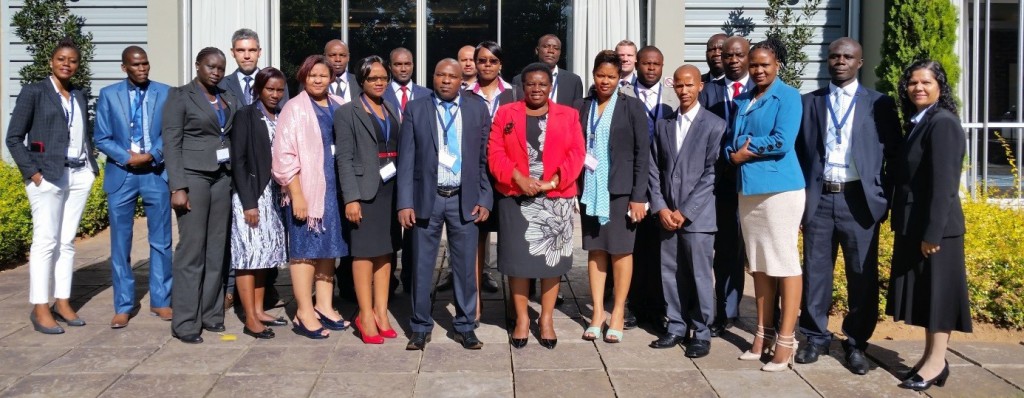The audit of extractive industries is a priority area for AFROSAI-E. We are therefore focused on building the capacity of auditors in the region to enable them to gain an understanding of the sector and guide them on how to conduct risk assessments of the sector in order to focus their audits where the risk is high. These training workshops and initiatives are also open for WGEI members.
Extractive Industries Training Workshop conducted in Johannesburg April 2016
AFROSAI-E arranged an Extractive Industries Training Workshop from 25 to 29 April 2016. The workshop was held in Johannesburg and subject matter experts were invited from WGEI CoP, SAI South Africa, SAI Zambia, SAI Norway, the GIZ and the African Tax Administrative Forum (ATAF). Participants from seven AFROSAI-E member SAIs, namely Botswana, Kenya, Namibia, Sierra Leone, South Africa, Uganda and Zambia attended this workshop. Participants included both regularity and performance auditors and they had ample opportunity to share their country experiences on the audit of extractive industries. The participants were provided with valuable tools to support their SAIs with the development of this critical focus area.

ATAF was invited to give a keynote address to share the outcomes from their special meeting on extractive industries (held in Johannesburg 11-13 April 2016) and; to share the challenges the tax administrations are facing in this area. The keynote address provided a valuable perspective about that the necessity for tax administrators and auditors in the SAIs to have the same knowledge and understanding of the industry. After all, the SAIs are auditing extractive industry revenues that are collected mainly by tax administrations in the region.
Participants were first provided with an introduction of the generic value chain and its seven steps as mentioned in AFROSAI-E’s guidelines on extractive industries. Then, subject matter experts from South Africa, Zambia and Uganda (WGEI) shared the specific value chain for diamonds, copper, oil and gas respectively. Several exercises were included in the workshop, both general and SAI specific ones, that provided a foundation for the SAIs to start a process of identifying the key risks in their respective extractive industry along the value chains seven steps. In addition, sessions were conducted, with the support of SAI Norway, WGEI (CoP) and the GIZ, on the major contract types and terms; transfer pricing and; Illicit Financial Flows (IFF). The discussions on IFFs were focused on providing participants with an understanding on the causes that enable IFF, and specifically on the major part that is derived from extractive industries. Poorly negotiated contracts were identified as one of the problem areas and awarding of contracts and licences were identified as step 3 in the value chain.
This workshop was very successful and an eye-opener for the participants, who were encouraged to share this knowledge with other colleagues in their SAIs and contribute to capacity building. They were also encouraged to carry out risk assessments along value chain for their extractive industries. A follow-up workshop is scheduled to take place in South Africa from 21 – 23 September 2016.
Governing Board Meeting in Abuja
AFROSAI-E’s 13th Governing Board Meeting took place in Abuja, Nigeria from 9 to 13 May.
Extractive Industries emerged as a very significant topic during the various breakaway sessions which focused on topics such as the sustainable development goals and fraud-risk.
Fiscal Governance Workshop in Pretoria
AFROSAI-E also held a session on the extractive industries value chain in the Fiscal Governance workshop which took place in South Africa from 25-29 July 2016. Extractive industries are part of the fiscal system that the SAIs need to gain an understanding of and pay more attention to.
Impact of Illicit Financial Flows on Extractive Industries and Sustainable Development Goals
Most of the SAI’s have the mandate and responsibility to audit the revenues from extractive industries. The SAIs can and should raise questions about the revenues received and not received, i.e. are all the revenues collected? What is the cause of leakage of the revenues? The collection of taxes and royalties is identified as step five in AFROSAI-E’s value chain for extractive industries.
Resources have the potential to fund sustainable human and economic development. Lack of engagement around resources can impede accountability and effective governance. If the revenues are not appropriately accounted for it is difficult for the region to achieve the Sustainable Development Goals such as, “No poverty”, “No hunger”, “Good health” and “Good Education”. These first four SDGs relate strongly to the revenues the countries generate through various taxations. It is also important for the SAIs to focus on other effects of extractive industries, such as the impact on the environment which links to the SDGs on “Clean Water and Sanitation”, “Clean Energy”, “Life Below Water” and “Life on Land”.
AFROSAI-E will continue to integrate extractive industries focus area in training workshops and guidance material, but it is of great importance that SAIs take the responsibility to build their capacity to better understand this complex sector, in order to raise the relevant issues in their audits.
By Afrosai-E





